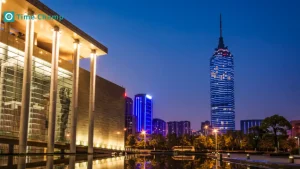The average salary in Singapore in 2024 is 90,285 SGD, which is approximately 67300.02 USD according to Average Salary Survey reports.
The average salary in Singapore and its advanced economy attracts global businesses and professionals from all over the world. Singapore is a small country, but a big economic hub in Southeast Asia. Singapore’s salary landscape is of great interest to most companies as well as job seekers!
In this blog, you will discover detailed information about the income that people usually earn in Singapore, standard wage levels, and many more factors affecting salary trends in this country. Let’s dive in!
What is the Average Salary in Singapore?
According to Average Salary Survey Reports, the average annual salary in Singapore in 2024 is 90,285 SGD which is around 67300.02 USD.
The average monthly salary in Singapore in 2024 is 7,524 SGD which is approximately 55.41 USD.
These numbers show that Singapore offers strong earning potential for workers across different industries. The salary levels reflect the city-state’s robust economy and high standard of living.
Singapore Minimum Wage
According to the Ministry of Manpower, there is no minimum wage in Singapore officially like in other countries. The government tries to help workers get fair pay rather than implementing a standard minimum wage by law.
Especially for low-income and foreign workers, the National Wages Council of Singapore provides guidance for employers on acceptable wages. Based upon careful economic analysis, they recommend what they believe constitutes fair compensation for wages across various sectors. From 2024 onwards, employers are advised to give low-income workers a base salary of 1,600 SGD (11.78 USD) per month, which increased from previous years.
Singapore has also developed an innovative system called the Progressive Wage Model (PWM). This approach tries to boost workers’ income improving their productivity and skills. The PWM applies to Singapore citizens and permanent residents working in specialized sectors, a dynamic mechanism that enhances earnings through self-development.
The government’s strategic approach to raising income levels and advancing workers is reflected by the fact that the PWM only covers a limited number of industries shown in the below table. The goal of this method is to create a more sustainable and skill-based compensation, in contrast to a fixed minimum wage.
| Sector | Minimum Wage Range in SGD Per Month | Minimum Wage Range in USD Per Month |
|---|---|---|
| Cleaning | 1,570-2,410 | 1172.24-1799.43 |
| Landscaping | 1,750-2,600 | 1306.64-1941.29 |
| Driving | 1,750-1,850 | 1306.64-1381.30 |
| Food Services | 1,915-2,215 | 1429.83-1653.83 |
| Security | 2,175-3,350 | 1623.96-2501.28 |
| Retail Trade | 1,975-2,395 | 1474.63-1788.23 |
Source: Wage Centre
Median Wage in Singapore
According to the World Salaries, the median wage in Singapore is nearly 103,580 SGD (762.87 USD) in 2024. The median wage provides a clear picture of what an average worker in Singapore might expect to earn. It represents the middle point of all salaries in the country, giving a more balanced view of income levels compared to looking at the highest or lowest wages.
Maximum Salary in Singapore
In Singapore, the maximum salary in 2024 per month is around 37,766 SGD (278.15 USD) and the annual maximum salary is 453,200 SGD (3337.85 USD) according to the World Salaries.
These figures represent the highest potential earnings across various industries and job roles in Singapore. The maximum salary can vary depending on factors like professional experience, industry, job level, and specialized skills. Highly skilled professionals in sectors such as technology, finance, and management often have opportunities to earn high salaries.
Highest-Paying Jobs in Singapore
| Profession | Average Annual Salary (in SGD) | Average Annual Salary (in USD) |
|---|---|---|
| Investment Banking Director | 320,000 | 238654.58 |
| Chief Technology Officer (CTO) | 250,000 | 186448.89 |
| General Practitioner | 252,000 | 187940.49 |
| Digital Transformation Specialist | 348,000 | 259536.86 |
| Engineering Manager | 212,000 | 158108.66 |
| Aviation Professional | 200,000 | 149159.12 |
| Legal Professional | 106,000 | 79054.33 |
| Management Consultant | 250,000 | 186448.89 |
| IT Cybersecurity Manager | 101,640 | 75802.66 |
| Marketing Director | 270,000 | 201364.81 |
Source: Reeracoen Singapore
Salary Ranges in Singapore
In Singapore, people can earn different amounts of money depending on their job. The average annual salary ranges from about 27,380 SGD to 453,200 SGD (20438.94 USD to 338309.94 USD). This means some workers might earn around 2,300 SGD (1716.93 USD) per month, while others can earn up to 37,767 SGD (28192.74 USD) per month.
The exact amount depends on the type of work, skills, and experience a person has. Some jobs in areas like technology, finance, and management tend to pay more, while other jobs might have lower salaries.
Factors Influencing Average Salary in Singapore
When it comes to salaries in Singapore, various factors play a key role in shaping how much employees earn. Below are some of the factors which affect average salaries in Singapore in 2024.
Average Salary in Singapore Across Various Industries
Singapore offers different pay rates depending on the type of work employees do. Let’s break down how much people typically earn in different job areas:
| Industry | Average Salary in Singapore in SGD Per Year | Average Salary in Singapore in USD Per Year |
|---|---|---|
| Management & Business | 132,255 | 98748.20 |
| Law | 115,935 | 86562.87 |
| Finance & Banking | 109,408 | 81689.48 |
| Health Care & Medical | 100,791 | 75255.60 |
| IT & Programming | 84,079 | 62777.59 |
| Automobile | 46,087 | 34410.86 |
| Construction & Labor workers | 69,979 | 52249.82 |
Source: Average Salary Survey
Singapore Average Salary Across Different Cities
Singapore is a small country with different areas where people work. The amount of money people earn can change depending on where they live and what job they do. In this section, you can find how much money people make in different parts of Singapore.
| City | Average Salary in SGD Per Year | Average Salary in USD Per Year |
|---|---|---|
| Ang Mo Kio | 36290.00 | 27,105 |
| Woodlands | 33238.72 | 24,826 |
| Bedok | 32942.83 | 24,605 |
| Pioneer | 34050.07 | 25,432 |
| Yishun | 30002.68 | 22,409 |
| Tuas | 29275.67 | 21,866 |
| Jurong Island | 31926.63 | 23,846 |
Source: Indeed
Average Salary in Singapore Based on Employee Experience
When people start working in Singapore, their salary depends a lot on how much experience they have. As workers gain more skills and spend more time in their jobs, they can earn more money. Let’s look at how salaries change as people progress in their careers.
| Experience Level | Average Salary in Singapore in SGD Per Year | Average Salary in Singapore in USD Per Year |
|---|---|---|
| 0-1 Year | 40,995 | 30608.92 |
| 1-2 Years | 48,959 | 36555.24 |
| 2-4 Years | 54,051 | 40357.18 |
| 4-8 Years | 76,115 | 56831.26 |
| 8-12 Years | 92,696 | 69211.47 |
| 12-16 Years | 116,849 | 87245.31 |
| 16-20 Years | 144,919 | 108203.77 |
| 20+ Years | 144,006 | 107522.08 |
Source: Average Salary Survey
Average Annual Salary Increment in Singapore
In 2024, workers in Singapore are likely to see their pay grow from 4% to 4.2%. This shows the job market is holding steady during changing economic times. Research by different groups suggests this modest increase will help workers keep up with the cost of living.
The technology field looks especially promising, with pay rises expected to reach around 4.5%. Other areas like banking and transportation are also looking at decent pay bumps. While the increase is not huge, it provides some financial relief after a challenging year in 2023.
Singapore Cost of Living
According to the latest Numbeo Cost of Living updates in Singapore, the monthly expenses for food, groceries, accommodation, and transportation costs in Singapore are given below:
Food Costs
There are many different prices for dining in Singapore. A simple meal at a low-cost restaurant is around 14 SGD (10.45 USD). If you want a complete meal with three courses, you need to spend nearly 90 SGD (67.20 USD). Meals in fast food places like McDonald’s cost around 10 SGD (7.47 USD). Most of the time, a local beer costs around 5 SGD to 16 SGD (3.73 USD to 11.95 USD). Singapore has food for everyone’s budget and these prices prove it.
Grocery Costs
In Singapore, grocery prices tell you how much it costs to eat. Food items are not too common. A loaf of bread costs about 2.89 SGD (2.16 USD), a liter of milk is about 3.61 SGD (2.70 USD), and a dozen eggs costs 4.32 SGD (3.23 USD). Chicken is good for protein and costs around 13.65 SGD (10.19 USD) per kg. People can buy food in Singapore without spending too much money.
Accommodation Expenses
Even in Singapore, rent is a pretty big chunk of living costs. Each month, it costs about 3,661.70 SGD (2734.01 USD) to rent an apartment in the city center. If you choose an apartment outside the city center, you can save around 2,677.50 SGD (1999.16 USD). The price changes depending on the location of the apartment. The city center is more expensive because you live closer to work and shops and that’s where most people like to be.
Transportation Costs
The price of transportation is not expensive, and it’s easy to get around in Singapore. A single bus or train ticket costs about 2 SGD (1.49 USD). A monthly pass costs around 120 SGD (89.60 USD) if you are planning to travel a lot. It’s simple to take a taxi, and trips start at 4.60 SGD (3.43 USD). The prices are perfect so that people can move around the city and get to other places fast.
Singapore’s Economic Outlook
According to the Ministry of Trade And Industry Singapore (MTI), the country’s economy will grow by about 3.5% in 2024. This means businesses are expected to do well and make more money this year. And they predict a slower but still positive economic growth between 1% and 3% in 2025.
Key Factors Supporting Singapore’s Growth
Let’s take a look at some of the key factors that are supporting Singapore’s economic growth.
Manufacturing Sector
In Singapore, the manufacturing sector especially the electronic industry helping the country’s growth. Important electronic parts are needed in many devices, such as phones, computers, and cars. The strong demand for these electronic parts is helping Singapore’s economy move forward. Semiconductor chip makers are receiving many orders from around the world. In 2024, this electronic sector grew by 5.4% compared to the last year making more products and selling more chips than before.
Tourism Sector Recovery
After the difficult years of COVID-19, Singapore’s travel and tourism sectors are bouncing back strongly. It’s great news for the country’s hotels, restaurants, and tourist spots, as more and more people are traveling again. In 2024, Singapore expects to welcome visitors between 15 to 16 million from around the world. This is a big jump from 2023 when the country had 13.6 million visitors. These travelers are expected to spend between $26 billion and $27.5 billion during their trips.
Inflation Trends
In 2024, Singapore expects prices to rise less quickly. That’s good news for people buying everyday items because the country’s inflation rate is expected to be about 3.4 percent. In October 2024, Singapore saw its prices rise more slowly than before. The inflation rate dropped to 1.4%, which is lower than the 2.0% seen in September. This is the lowest price increase since early 2021.
Should You Consider Outsourcing to Singapore?
Singapore offers many wonderful opportunities for businesses looking to grow and improve. This dynamic country has become an attractive destination for companies seeking to enhance their operational capabilities through strategic outsourcing.
The business environment in Singapore is exceptionally strong, because of having highly skilled workers who are well-trained and ready to deliver outstanding results. The country’s education system makes talented professionals who are capable of handling complex tasks in an effective way.
The country boasts advanced infrastructure and modern technology that supports business growth, creating an ecosystem where companies can thrive. Working in Singapore might cost more money compared to other countries, but businesses get a lot of value for what they spend. When companies choose to work with Singapore, they get high-quality work, good results, and access to workers who understand how business works around the world.
Track your Remote Team Productivity Using Time Champ Effectively
Tracking remote team productivity has become essential for businesses to get better results in work environment. When employees work from different locations, companies face significant challenges in understanding how work gets done and ensuring team effectiveness.
Without proper tracking, you can’t clearly see how your team members are spending their work hours, which makes it difficult to measure actual performance and progress. But using employee productivity tracking software like Time Champ, you can improve your business productivity.
Whether you are outsourcing to Singapore or some other countries, Time Champ helps you to keep track of your employees’ productivity and understand their performance easily. Here’s how Time Champ helps to improve your business:
Automatic Time Tracking
Don’t need to worry about logging employees’ time manually, Time Champ tracks employees work hours automatically. By capturing every minute employees spent on their work, Time Champ provides accurate reports making it easy for businesses to see how time is allocated across different projects and tasks.
Productivity Tracking
Stop guessing about your team’s productivity and start getting real insights using Time Champ. Time Champ provides comprehensive productivity analysis to businesses by breaking employee time into productive, unproductive and neutral hours. Capturing detailed information about how employees’ work, and giving a clear picture of productivity levels across tasks helps you enhance productivity in organization.
Activity Tracking
Time Champ tracks employee activities accurately by monitoring which applications and websites they use during work hours. Time Champ gives clear activity reports of where time is being sent by the employees to finish their tasks. Detailed activity tracking helps businesses understand productivity patterns and identify any distractions that might be affecting work.
Project Management
Don’t need to stress about assigning tasks or tracking deadlines manually. Time Champ makes project management simple and efficient for managing remote teams. You can easily assign projects to team members and set clear deadlines, ensuring that all tasks are organized and prioritized. By integrating with other project management tools, Time Champ helps you see the progress of each project at a glance.
Automatic Timesheets
You don’t need to worry about creating timesheets manually. Time Champ automatically generates timesheets for each employee, recording their work hours without any extra effort. Employees can focus on their tasks instead of spending time filling out forms. Time Champ captures all the hours worked, making it easy for businesses to review and approve timesheets quickly to simplify payroll process.
Final Words
In summary, the average salary in Singapore reflects the country’s strong economy and high demand for skilled workers. Understanding this salary landscape helps both job seekers and employers navigate the market effectively. As Singapore continues to evolve, staying informed about economic trends and salary expectations is crucial. For those considering a move or a career change, now is a great time to explore opportunities in this vibrant city-state.
Boost your remote team's productivity today—Sign up for Time Champ and take control of your team's efficiency like never before!
Signup for FreeBook DemoFrequently Asked Questions
A good salary in Singapore varies based on personal needs and lifestyle. However, considering the cost of living, a monthly salary between 7,680 SGD and 11,600 SGD is generally considered good.
To live comfortably in Singapore, a salary that covers living expenses, which can be high, is needed. This could range anywhere from 7,000 SGD to 10,000 SGD per month, depending on lifestyle choices and family size.
Generally, salaries in Singapore are structured to cover the cost of living, which is one of the highest in the world. However, individual circumstances like personal spending habits and family responsibilities can affect this.
Yes, Singapore has a comprehensive legal framework to protect employee rights, including regulations on work hours, overtime, annual leave, and provisions for maternal and childcare leave.







